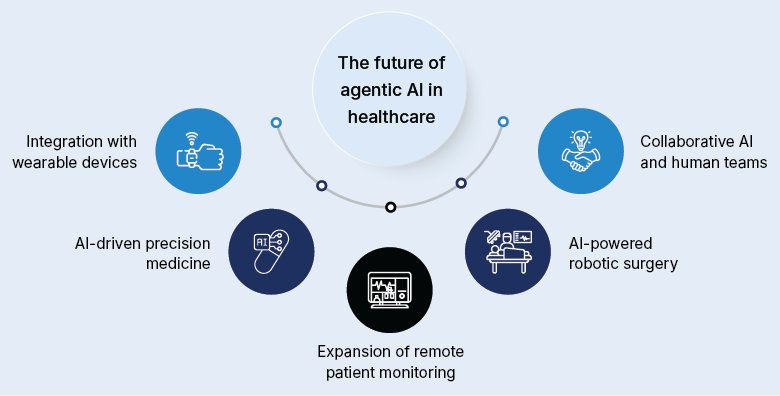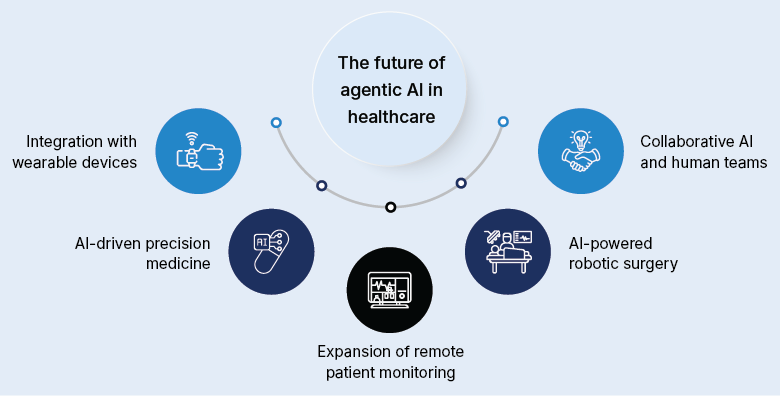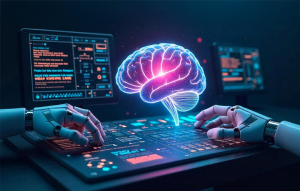The healthcare industry is crucial for protecting the health and lifespan of people, boosting economic development, and enhancing the quality of life. However, the sector is increasingly confronted with rising patient expectations, intricate regulatory requirements, and the demand for cost-effective treatments. It is further challenged by inefficiencies in managing patients, data security issues, and the integration of advanced medical technologies. Innovative solutions are necessary to streamline operations, enhance patient outcomes, and ensure the delivery of high-quality, personalized care.
Do you often wonder how to:
- Augment patient scheduling to reduce waiting times and improve patient flow.
- Decide the most effective treatment plans for patients based on their unique medical histories and current conditions.
- Ensure that you’re up to date with the latest medical research and guidelines.
- Improve the accuracy of diagnoses and reduce the risk of human error.
- Coordinate better to provide care among different specialists and departments.
The solution is integrating agentic AI into healthcare processes. This helps healthcare providers to enhance patient care through advanced data analysis, personalized treatment plans, and efficient resource management.
Let’s look at a few numbers about agentic AI and AI agents by Gartner:

Let’s look at the top use cases of agentic AI in healthcare
Medical diagnostics
Challenge: Analyzing complicated medical data is time-intensive and prone to human error. This often leads to delayed or incorrect diagnoses.
How agentic AI helps:
- Automates analysis of medical images, laboratory results, and patient histories to identify anomalies.
- Suggests accurate diagnoses based on vast datasets and advanced pattern recognition.
- Facilitates early detection of critical conditions like cancer, cardiovascular diseases, and neurological disorders.
Business impact:
- Reduces errors in diagnosis and improves patient outcomes
- Accelerates up the diagnostic process and saves time
- Improves the credibility and reputation of healthcare providers
Personalized treatment plans
Challenge: Developing and adjusting treatment plans tailored to individual patients requires extensive time and effort, which can hinder personalized care.
How agentic AI helps:
- Leverages real-time patient data to create dynamic and customized treatment plans quickly.
- Considers genetic makeup, lifestyle, and ongoing responses to treatment for precise care.
- Continuously refines treatment plans to adapt to changes in patient conditions.
Business impact:
- Improves patient satisfaction through tailored care.
- Enhances treatment success rates
- Reduces overall healthcare costs
Healthcare operations automation
Challenge: Administrative tasks like scheduling, resource allocation, and inventory management.
How agentic AI helps:
- Augments workflows by automating scheduling of appointments and staff assignments.
- Avoids shortages or overstocking by streamlining inventory tracking and resource allocation.
- Ensures seamless operations by reducing errors in administrative processes.
Business impact:
- Frees up staff to focus on patient care
- Improves operational efficiency
- Enhances patient satisfaction
Agentic AI: Redefining the future artificial intelligence
Discover the transformative power of agentic AI in the insurance industry! Explore its impactful use cases and benefits. Transform your business with cutting-edge AI insights today!

Drug discovery and research
Challenge: Traditional drug discovery is a slow and expensive process.
How agentic AI helps:
- Analyzes vast datasets to identify potential drug candidates efficiently.
- Simulates clinical trials to predict drug effectiveness and safety.
- Identifies patterns and insights from molecular studies, speeding up the R&D process.
Business impact:
- Reduces the time and cost of developing drugs significantly
- Faster availability of life-saving medications
- Boosts innovation in pharmaceutical research
Patient monitoring and telemedicine
Challenge: Continuous patient monitoring, especially chronic conditions, requires a lot of resources and becomes unmanageable in remote locations.
How agentic AI helps:
- Analyzes real-time data from wearable devices to monitor vital signs and detect anomalies.
- Virtual consultations are facilitated by providing actionable insights to healthcare providers.
- Sends timely alerts for interventions to prevent complications.
Business impact:
- Reduces hospital readmissions.
- Expands access to healthcare services in remote or underserved areas.
- Improves patient outcomes through timely interventions and supervising.
Thrive in an age of constant reinvention
Ready to witness the transformative power of RAG-powered AI agents in redefining your decision making?

Benefits of agentic AI in healthcare
1. Improved diagnostic accuracy
Agentic AI significantly reduces human errors in diagnosis, leveraging advanced algorithms to analyze medical data with precision. This enhances diagnostic outcomes, enabling early and accurate detection of conditions.
2. Enhanced operational efficiency
From scheduling to resource allocation, agentic AI optimizes administrative and clinical workflows, saving time and reducing operational bottlenecks.
3. Personalized patient care
Agentic AI tailors treatment plans to individual patients, factoring in unique needs like genetic profiles and lifestyle for highly personalized care.
4. Reduced healthcare costs
By minimizing waste and optimizing resource utilization, agentic AI helps healthcare providers reduce costs without compromising on service quality.
5. Scalability of services
Agentic AI expands the reach of quality healthcare, making services accessible to patients in remote areas and underserved communities.
Agentic AI: Redefining the future artificial intelligence
Explore agentic AI in depth. Learn about the key differences between traditional and agentic AI. Understand its workflow and benefits of agentic AI.

Addressing challenges in implementing agentic AI
1. Data privacy and security
Healthcare data is sensitive and should be protected against breaches. This requires strong cybersecurity and adherence to laws such as HIPAA in the protection of patient information, thereby maintaining trust.
2. Ethical considerations
Agentic AI must operate within ethical boundaries, especially in clinical decision-making. Transparent processes and clear guidelines are vital to ensure AI decisions align with ethical standards, particularly in life-critical scenarios.
3. Integration with existing systems
Integrating agentic AI into current healthcare infrastructure requires significant investment and coordination. Collaboration between developers, healthcare providers, and IT experts ensures seamless functionality and effective adoption.
4. Ensuring accuracy and reliability
Agentic AI systems must undergo rigorous validation and continuous monitoring to ensure reliability. Regular updates and testing are crucial for maintaining their effectiveness in clinical applications.

Embrace the future: The transformative impact of agentic AI in healthcare
The healthcare paradigm shift that is happening because of the introduction of agentic AI is significantly changing the way medical services are delivered and managed. This can enhance diagnostic accuracy, improve operational efficiency, and allow for mass customization. While challenges like data privacy, ethical issues, and system integration persist, proactive measures can ensure responsible use of this technology. Agentic AI will shape the future of healthcare toward better patient and provider outcomes. To know more about the benefits of agentic AI services, talk to our experts.









